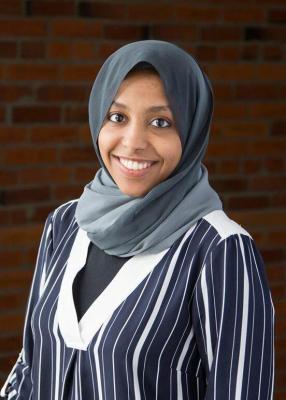City College of New York Computer engineer and scientist Samah M. Saeed is the co-recipient of a $4.6 million U.S. Department of Energy[DoE] grant to advance quantum computing. The funding is for her project, “Toward Efficient Quantum Algorithm Execution on Noisy Intermediate-Scale Quantum Hardware.”
An assistant professor of electrical engineering in CCNY’s Grove School of Engineering, Saeed will focus on resolving the issues currently affecting the development of quantum computing. The ultimate goal is to develop research and training programs to enable efficient and reliable executions of quantum algorithms on large-scale quantum computers.
"The future of computing is quantum, an emerging computing paradigm that will offer a computational speedup for critical applications,” said Saeed. “Near-term quantum computers, referred to as Noisy Intermediate-Scum (NISQ) computers, are expected to have a transformative impact on applications demanding intense computation, such as machine learning and physical and chemical simulations.“
While these computers are very promising, Saeed added, they are fragile and operate in the presence of errors. As a result, there is a gap between current and near-term quantum hardware capabilities and quantum algorithms, which should be addressed to exploit the power of quantum computers. Although error correction is the ultimate solution to suppress errors and enable the correct execution of quantum algorithms, they are infeasible for near-term quantum computers due to the massive number of physical qubits required to correct errors.
Other objectives of Saeed’s project include:
- To build a theoretical foundation of quantum noise modeling and its impact on quantum circuit design;
- To develop a robust and scalable software package for error mitigation that requires minimum interaction with quantum computers and noise-aware quantum circuit optimization methods; and
- To build the next generation of quantum computing experts and increasing both the capacity and quality of traditionally underrepresented minorities (URM) participation in quantum computing.
In addition, it will build a strong foundation in quantum information science and quantum computing at CCNY through collaboration with the co-PI from Lawrence Berkeley National Laboratory (LBNL). The project will provide an extensive two-pronged training program involving onsite training at the CCNY open to the entire college community to increase participation of underrepresented groups in the quantum computing workforce and summer research at LBNL. The idea is to enable interaction with a broader team of quantum-focused researchers with a diverse background including physics, computer science, and applied mathematics at LBNL.
Last Updated: 09/27/2023 14:16
